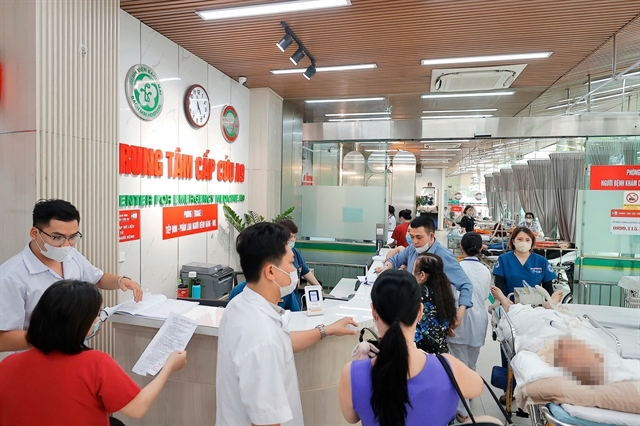 Society
Society


|
| Emergency care and treatment in progress at the A9 Emergency Centre in Bạch Mai Hospital in Hà Nội. VNA/VNS Photo Minh Quyết |
HÀ NỘI — A recent surge in assaults against healthcare workers at hospitals nationwide has raised alarm over the urgent need for stronger legal safeguards to protect medical staff in the line of duty.
These incidents most frequently occur in emergency departments, particularly during the admission of patients injured in traffic accidents, street fights or mass casualty situations. Such acts of violence not only cause physical and psychological harm to doctors and nurses but also severely disrupt the operations of medical facilities.
The most recent case took place on May 31 at the Emergency Department of Nghệ An General Friendship Hospital in Vinh City. Surveillance footage captured at 11.54pm shows a man shouting while speaking to a female staff member at the reception desk. He then lunged over the counter and slapped her. The attack was swiftly stopped by hospital security and a bystander.
Nghệ An Provincial Department of Health ordered the hospital to file a detailed report on the incident. On June 3, police detained Tuấn Anh, a 32-year-old resident of Nghi Kim Commune in Vinh City, for investigation on charges of disturbing public order.
Just a month earlier, on May 4, a healthcare worker at Nam Định General Hospital was pushed and struck in the face by a patient’s relative. The assailant was later prosecuted for public disorder.
In another case on April 25, doctors at Thanh Ba District Medical Centre in Phú Thọ Province were physically assaulted by family members while treating a 12-year-old boy suffering from anaphylactic shock.
Despite the commotion, the medical team remained composed, maintained their positions, and continued life-saving efforts without retaliation. The individual, who attacked a nurse, was fined VNĐ30 million (approximately US$1,200).
Previously, a doctor at the emergency unit of Chư Sê District Medical Centre in Gia Lai Province suffered psychological trauma after being assaulted by a patient’s family member.
According to the Director of the Medical Service Administration under the Ministry of Health, Hà Anh Đức, the healthcare sector operates under intense pressure, handling around 200 million patient visits annually.
Meanwhile, the healthcare workforce remains insufficient to meet rising demands. Overloaded systems and increasingly complex patient expectations can lead to frustration and dissatisfaction when services do not meet expectations, often turning medical workers into unintended targets.
Emergency care must prioritise lives
In response to recent assaults on healthcare workers, leading hospital directors have stressed that saving lives must remain the top priority in emergency care, while also calling for stronger protection measures and better cooperation from the public.
The Director of Việt Nam-Germany Friendship Hospital in Hà Nội, Dr Dương Đức Hùng, underscored that all staff at the hospital are strictly instructed to focus entirely on treating emergency patients, bypassing routine paperwork and financial procedures when necessary.
“Time is the most critical factor in emergency cases,” Hùng said. “In life-threatening situations, even when there are no family members present, hospital shift leaders are authorised to sign consent forms to proceed with procedures like tracheotomy.”
He emphasised that the Ministry of Health’s regulations already provide clear guidance: “There should be no barriers in emergency care. Administrative and financial steps must be simplified. We can’t delay surgery because we’re waiting for signatures while a patient is bleeding out. That could cost a life.”
Hùng shared that the hospital handles dozens of emergency cases daily. Many patients undergo surgery and even pass away before settling hospital fees.
“We’ve never made payment or paperwork a precondition for urgent medical intervention,” he said.
To minimise tension and potential conflict, the hospital conducts regular training sessions on professional conduct and communication for all staff, including doctors, security guards and janitors. Frontline staff, especially security personnel, are trained to remain calm and polite when interacting with patients and families.
Associate Professor Đào Xuân Cơ, Director of Bạch Mai Hospital, one of the leading hospitals in the country, reported that the hospital handles between 500 and 900 emergency cases per day, in addition to 6,000 to 8,000 outpatient visits. The intense workload requires not only medical expertise but also crisis management skills.
To that end, the hospital has developed specific response protocols tailored to different types of emergency scenarios. The hospital works closely with internal security teams and local police to maintain safety, particularly in high-tension areas like the emergency department.
The hospital also invests heavily in training staff on communication and conflict de-escalation.
“We’ve built a professional, patient-centred image by helping our staff remain calm, handle stress and defuse confrontations,” Cơ said. “Thanks to these efforts, we’ve seen a significant drop in violent incidents in recent years.”
However, he stressed that maintaining this progress requires ongoing collaboration.
“We urge the public to work cooperatively with healthcare workers, especially in emergency situations. Mutual understanding is key.”
On the policy front, Đức reaffirmed that any act of violence against healthcare workers, particularly while performing their duties, is unacceptable.
In the wake of recent attacks, the ministry has issued directives to all local health departments, urging them to coordinate immediately with police forces to enhance security at hospitals and protect frontline staff.
Since 2014, the Ministry of Health and the Ministry of Public Security have maintained a formal cooperation agreement that includes measures to safeguard hospital environments. The ministry has also advised hospital directors to strengthen security in high-risk departments, such as emergency rooms and intensive care units.
Dr Hùng added that broader reforms in hospital administration must continue to put patients at the centre of their work.
“All policies should aim to reduce burdens on patients while preserving the integrity of care,” he said. — VNS




